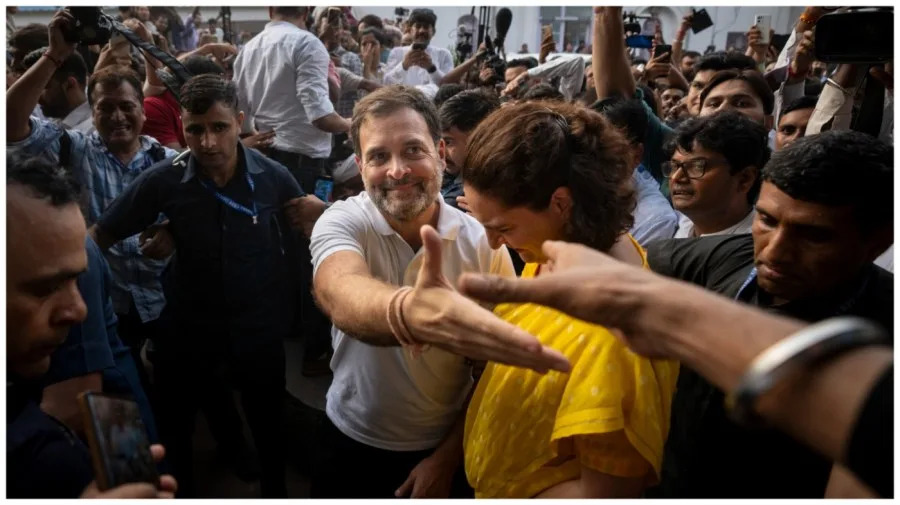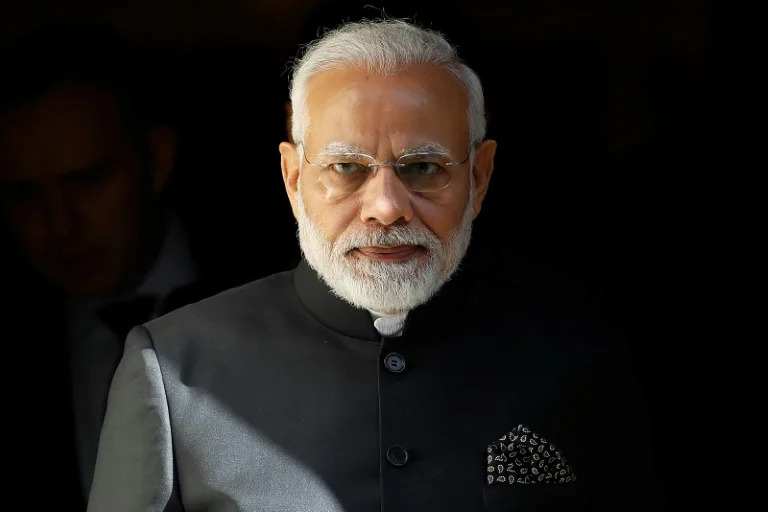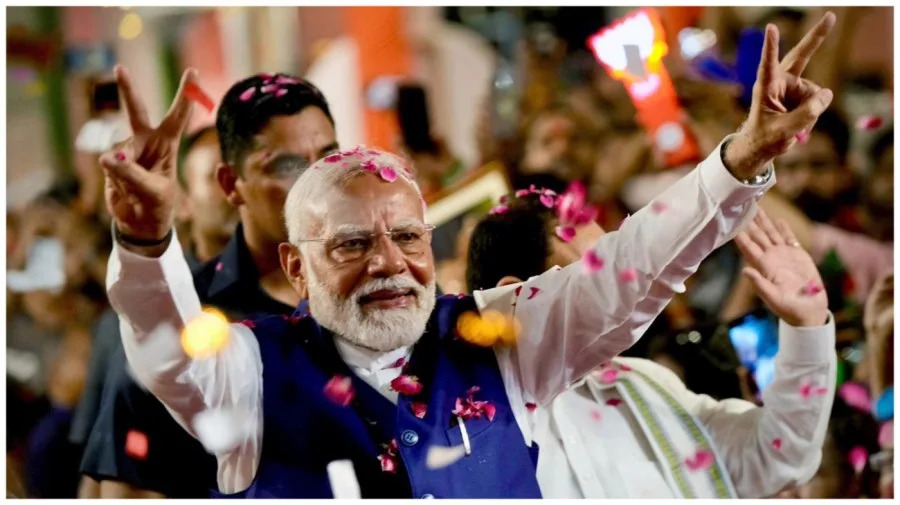Prime Minister Narendra Modi's political alliance won India's weeks-long general election on Tuesday, but the opposition said voters had sent a clear message after his Hindu nationalist party lost its parliamentary majority for the first time in a decade.
Commentators and exit polls had projected an overwhelming victory for Modi, whose campaign wooed the Hindu majority to the worry of the country's 200-million-plus Muslim community, deepening concerns over minority rights.
The alliance led by Modi's Bharatiya Janata Party (BJP) won an overall parliamentary majority, results on the election commission website showed late Tuesday.
But the BJP itself was projected to secure only 240 seats of its own, well down on the 303 it won at the last polls five years ago, meaning it would need to rely on its alliance partners to pass legislation.
India had given the party and its allies a mandate "for a third consecutive time", Modi told a crowd of cheering supporters in the capital New Delhi.
"Our third term will be one of big decisions and the country will write a new chapter of development. This is Modi's guarantee."
But in a remarkable turnaround largely driven by deals to field single candidates against the BJP's electoral juggernaut, the main opposition Congress party was expected to take 99 seats, almost doubling its 2019 tally of 52.
"The country has said to Narendra Modi 'We don't want you'," key leader Rahul Gandhi told reporters. "I was confident that the people of this country would give the right response."
With more than 99 percent of votes counted, the BJP's vote share at 36.6 percent was marginally lower than at the last general election.
Modi was re-elected to his constituency representing the Hindu holy city of Varanasi by a margin of 152,300 votes -- compared to nearly half a million votes five years ago.
Among the independent lawmakers elected were two serving time in jail -- firebrand Sikh separatist preacher Amritpal Singh, and Sheikh Abdul Rashid from Indian-administered Kashmir, who was arrested on charges of "terror funding" and money laundering in 2019.
- 'Moral defeat' -
Celebrations had already begun at the headquarters of Modi's BJP before the full announcement of results.
But the mood at the Congress headquarters in New Delhi was also one of jubilation.
"BJP has failed to win a big majority on its own," Congress lawmaker Rajeev Shukla told reporters. "It's a moral defeat for them."
Stocks slumped on speculation the reduced majority would hamper the BJP's ability to push through reforms.
Shares in the main listed unit of Adani Enterprises -- owned by key Modi ally Gautam Adani -- nosedived 25 percent, before rebounding slightly.
Modi's opponents fought against a well-oiled and well-funded BJP campaign machine, and what they say are politically motivated criminal cases aimed at hobbling challengers.
US think tank Freedom House said this year that the BJP had "increasingly used government institutions to target political opponents".
Arvind Kejriwal, chief minister of the capital Delhi and a key leader in an alliance formed to compete against Modi, returned to jail on Sunday.
Kejriwal, 55, was detained in March over a long-running corruption probe, but was later released and allowed to campaign as long as he returned to custody once voting ended.
"When power becomes dictatorship, then jail becomes a responsibility," Kejriwal said before surrendering himself, vowing to continue "fighting" from behind bars.
- 'Strength of Indian democracy' -
Many of India's Muslim minority are increasingly uneasy about their futures and their community's place in the constitutionally secular country.
Modi himself made several strident comments about Muslims on the campaign trail, referring to them as "infiltrators".
The polls were staggering in their size and logistical complexity, with 642 million voters casting their ballots -- everywhere from megacities New Delhi and Mumbai to sparsely populated forest areas and the high-altitude Himalayas.
"People should know about the strength of Indian democracy," chief election commissioner Rajiv Kumar said Monday, calling the counting process "robust".
Based on the commission's figure of an electorate of 968 million, turnout came to 66.3 percent, down roughly one percentage point from 67.4 percent in the last polls in 2019.
Analysts have partly blamed the lower turnout on a searing heatwave across northern India, with temperatures over 45 degrees Celsius (113 degrees Fahrenheit).
AfriPrime App link: Absolutely risk free and FREE for download...
https://www.amazon.com/Africircle-AfriPrime/dp/B0D2M3F2JT
Modi 3.0 to push India towards becoming a Hindu nation
Indian Prime Minister Narendra Modi's third-term win Tuesday was not the landslide victory he had wanted, but it still provides the mandate to power his Hindu nationalist agenda forward, analysts say.
Victory for Modi -- whose Bharatiya Janata Party (BJP) and allies were on track to win 291 out of 543 elected seats -- was forged in large part by the premier's appeal to the Hindu faithful, worrying minorities including the country's 200-million-plus Muslim community.
Modi's decade as premier has seen him cultivate an image as an aggressive champion of the country's majority faith, holding well-publicised temple visits, fasts and meditations to burnish his religious credentials.
"God has chosen us to serve Bharat (India) and fulfil our role in our country's journey towards excellence," Modi wrote in an op-ed Monday in the Indian Express, using the country's name in Sanskrit, a word dating back to ancient Hindu scriptures.
But a resurgent opposition proved stronger than many had predicted, and for the first time in a decade, the BJP is without an overall majority of its own and dependent on alliance partners.
- 'New Modi' -
"For BJP, complacency was one of the biggest enemies," Nistula Hebbar, political editor of The Hindu newspaper told AFP.
"We will now see an entirely new Modi, because we've never seen Modi operate a government without a full majority."
It forces Modi to tread more carefully to ensure backing for more controversial policies.
"With this, we come back to a more traditional form of Indian politics where there will be an alliance government," said Hartosh Singh Bal, the political editor of The Caravan magazine in New Delhi.
But if Modi can keep his allies onboard, his third term will see the BJP introduce new policies that would likely further blur the line between state and religion -- despite India's secular constitution.
"They have already been following the agenda to make India a Hindu nation," political analyst Ramu Manivannan told AFP.
"That's their ultimate goal and they are making no effort to hide it."
- Legal overhaul -
Among the planned policies is the potential introduction of a new national common civil code, to standardise laws across all religious communities.
India's 1.4 billion people are subject to a common criminal law, but rules on personal matters such as marriage, divorce and inheritance vary based on customary traditions.
Women's rights vary considerably depending on which code they fall under -- Hindu sons and daughters theoretically enjoy equal inheritance rights, while Muslim daughters are only entitled to a fraction of any male heir's inheritance.
Many right-wing politicians, jurists and reformists have described these custom-based codes as regressive and have lobbied for a legal framework that would apply to all Indians equally.
But many communities, particularly Muslims, fear the new law would encroach on their religious laws and see it as an attack on their identity and against India's constitution.
With their fresh mandate, the BJP is also likely to see calls from Hindu activists to take more religious sites from Muslims.
The calls have grown louder since Modi inaugurated a grand temple to the deity Ram in January, built on the grounds of a centuries-old mosque in Ayodhya razed by Hindu zealots in 1992.
Other locations across India's north include Mathura and Varanasi, where activists have sought to replace centuries-old Islamic monuments with Hindu temples.
"This is definitely going to be an issue in the coming years. They (BJP) don't say it openly but they have given enough subtle hints," said political analyst Sunita Aaron.
"The BJP manifesto mentioned only the Ram temple, but political parties can always change tracks."
- 'Absolute power' -
Modi's third term could also likely see the "divisive" revision of electoral boundaries based on population.
That would likely mean a significant expansion of seats in northern states -- which the BJP considers its heartland -- reducing the overall parliamentary punch of opposition areas in the relatively less-populous south.
"It will be quite testing for the Indian union and the federal polity," Manivannan said, calling the proposal "quite divisive".
"The southern states won't take it lying down," Manivannan added. "Absolute power demolishes reason, you have to be cautious about that."
AfriPrime App link: Absolutely risk free and FREE for download...
https://www.amazon.com/Africircle-AfriPrime/dp/B0D2M3F2JT
India delivers shocking election result: What to know
Narendra Modi won a third term as India’s next prime minister Tuesday, however his political party won a slimmer-than-expected margin despite the polls overwhelmingly indicating a blowout.
India’s opposition, largely written off heading into the election, defied all expectations and poses a serious threat to Modi’s majority.
Modi’s Bharatiya Janata Party (BJP) and its National Democratic Alliance has yet to secure the 272 seats needed for a parliamentary majority, as it had easily won in 2014 and 2019.
“This is clearly a setback for Modi, in large part because he was expected to do so much better than he did,” said Sadanand Dhume, senior fellow at the American Enterprise Institute.
“Modi’s aura of invincibility has been severely dented.”
Here’s what to know.
Modi’s majority to shrink after surprise results
While Modi and the BJP are claiming victory, the results will sting, having come well short of the projected landslide. The biggest setback for Modi’s party came from three states that send the highest number of members to India’s lower house, or Lok Sabha — Uttar Pradesh, Maharashtra and West Bengal.
While counting is still underway in India, as of Tuesday morning the initial numbers suggest that the BJP party has fallen short of the 272 seats needed for a majority on its own and will need members of its alliance to form a government.
The main opposition Indian National Congress, or Congress Party, is projected to more than double its 2019 tally, with around 100 seats on its own and 230 for its opposition bloc.
Despite results still trickling in, Modi addressed his supporters Tuesday declaring the results “a very big win.”
“I will say to every voter of the country on this moment of victory, I want to bow down and salute them,” Modi said in New Delhi.
According to Rohan Mukherjee, an assistant professor of international relations at the London School of Economics, if current projections hold, Modi’s BJP will need to change its approach.
“Modi will have to govern more cautiously as there will be parties in his coalition with the power to undermine his government’s initiatives,” Mukherjee added.
Before Modi’s meteoric and overwhelming rise to power in 2014, this was often the case in past coalition governments.
And it stands in stark contrast to predictions ahead of the election that Modi would use a massive mandate at the ballot box to push ahead with divisive reforms.
“This rests speculation that he could embark upon a dramatic agenda on things like constitutional amendment, that’s just not going to be possible,” Dhume said of Modi’s shrinking majority.
“It’s going to be, have to be much more negotiated, much more of the kind of governance that you would normally see in a highly contested parliamentary democracy.”
How did Modi lose his mojo?
According to Dhume, Modi’s shrinking majority could be attributed to a complex mix of politics, economic dissatisfaction and concerns about democracy.
“Some of this is truly befuddling, because he did pretty badly in Uttar Pradesh. He swept Madhya Pradesh next door. So it’s a whole bunch of causes, and you also have to factor in the fact that despite all this hype, it’s very, very difficult to win three terms in a row in India,” he said.
The last time a political party won a third term in India was in 1962 with Congress and India’s first prime minister, Jawaharlal Nehru.
In April, Modi was accused of using hate speech after he called Muslims “infiltrators” — some of his most incendiary rhetoric about the minority faith.
Critics of the prime minister — an avowed Hindu nationalist — say India’s tradition of diversity and secularism has come under attack since his BJP won power a decade ago.
They accuse the party of fostering religious intolerance and sometimes even violence. The party denies the accusation and says its policies benefit all Indians.
According to Deepa M. Ollapally, research professor of International Affairs at George Washington University, “Modi and by extension, the BJP have been weakened, maybe even humbled.”
Ollapally added that the challenge they faced in their traditional Hindi heartland stronghold is a “sobering wake up call that jobs, economic relief and social justice are more important than religious sentiment or international prestige.”
Opposition leader says voters sent a clear message

Rahul Gandhi, the scion of India’s powerful political dynasty, the Nehru-Gandhi family, hailed the election results as a win for democracy in India.
“The main thing that this election has said, the country has clearly and unanimously stated: We do not want Narendra Modi and Amit Shah to be involved in running of this country. We do not like the way they have run this country. We do not appreciate the way they have attacked the Constitution. That is a huge message to Narendra Modi,” Gandhi said at a party press conference.
Shah is Modi’s powerful minister of home affairs and right-hand man.
Gandhi’s father, grandmother and great-grandfather were all previous prime ministers of India.
What this means for India-US relations
Despite the unexpected drama, Modi will remain in the top job, and there is unlikely to be significant change in relations with the U.S.
“It was coalition governments that developed the strong foundations for cooperation with Washington in the first place,” Mukherjee said to The Hill.
“While the cost of foreign policy initiatives may be higher now for Modi in terms of keeping his ruling coalition together, the BJP is still a dominant party and there is a political and economic logic to U.S.-India relations that will keep things ticking along,” he added.
“Shared concerns about China’s strategic challenge will keep India and U.S. closely aligned, no matter the political equation,” Ollapally said.
However, according to Mukherjee, if there is change, it will be due to differences in national interests and not Modi’s diminished mandate.
“If anything, the result is an affirmation of Indian democracy, which should also assuage some India skeptics in Washington,” he added.
AfriPrime App link: Absolutely risk free and FREE for download...




